#battle marengo
Explore tagged Tumblr posts
Text
Napoleon the Great :: Andrew Roberts
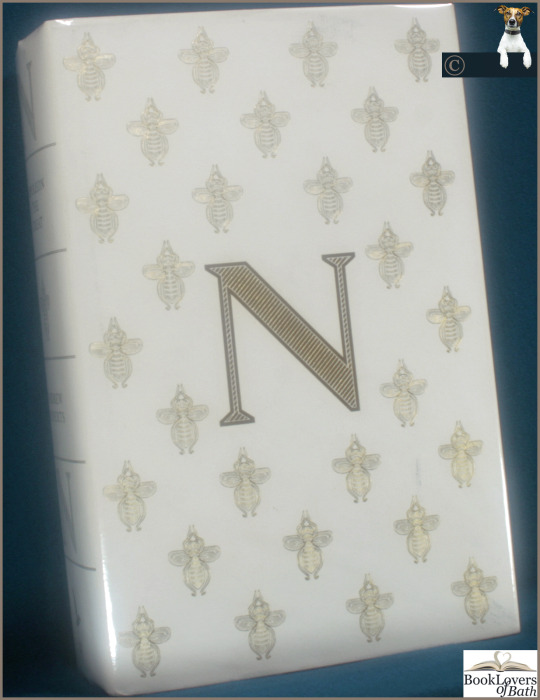
View On WordPress
#978-1-8461-4027-3#austerlitz#battle borodino#battle marengo#books by andrew roberts#brumaire#campaign#confederation rhine#elba#emperors france#first french empire#french emperor#french emperors#french history#french kings#french rulers#french statesmen#history france#marengo#napoleon i#napoleonic france#napoleonic wars#polish campaigns#st helena#syrian campaigns#waterloo
1 note
·
View note
Text
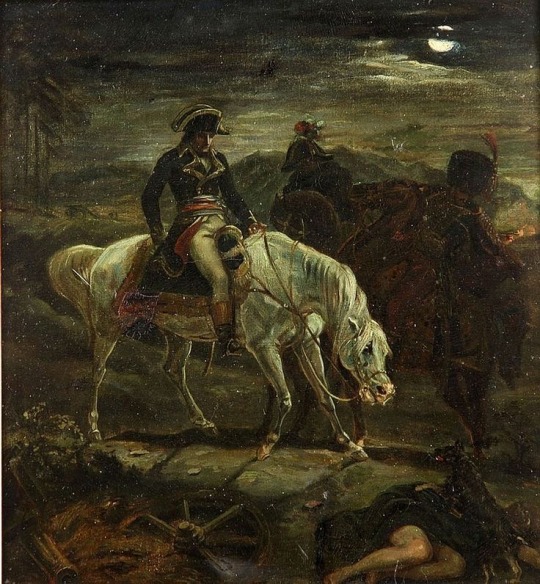
#napoleon bonaparte#napoléon bonaparte#marengo#horse#art#napoleon#bonaparte#napoléon#history#battlefield#battle#napoleonic#napoleonic wars#europe#european#france#french#general#moon
265 notes
·
View notes
Text
Eugène gets promoted (battle of Marengo)
Translated from the first volume of "Mémoires et correspondance politique et militaire du Prince Eugène" by Albert DuCasse again. This is about the second half of the battle of Marengo, when Desaix's arrival on the battlefield enabled the French to take the offensive again:
Finally, at around five o'clock, General Desaix joined us, and the First Consul was able to resume the offensive. General Lannes' troops, encouraged by this reinforcement, reformed, and soon the attack began, as did the enemy's retrograde march. General Kellermann's cavalry made a very fine charge on our left and, towards evening, the guard cavalry made an equally brilliant one. Although the terrain did not favour us, since we had two ditches to cross, we rushed with vigour against a column of cavalry much more numerous than us, just as it was deploying; we pushed it as far as the first bridges over the waters of the Bormida, constantly attacking with our sabres. The melee lasted ten minutes: I was lucky enough to get away with two sabre blows to my shabrack. The next day, the First Consul, on hearing the account of the affair, appointed me chef d'escadron. My squadron had suffered quite a bit, for, of the one hundred and fifteen horses I had in the morning, I had only forty-five left in the evening; it is true that a picket of fifteen chasseurs had remained close to the First Consul, and that many of the chasseurs, dismounted or slightly wounded, returned one after the other.
The official date of the promotion is 9 July 1800, and according to the "Moniteur", that's two days after Berthier had returned to Paris. Eugène himself at this time was still on the march.
(There's also sometimes cited a letter from Napoleon to Josephine, praising Eugène for taking captive an Austrian general during the battle. However, that letter is pretty sure a later fabrication, as there are so many. Eugène makes no mention of such an event.)
12 notes
·
View notes
Text
Napoleon’s letter the day after the death of Desaix

“The news of the army is very good. I shall soon be in Paris. I cannot tell you more; I am in the deepest sorrow at the death of the man I loved and esteemed the most.”
— Napoleon
Source: Letters and Documents of Napoleon by J. E. Howard
#Louis Desaix#J. E. Howard#Howard#desaix#Letters and Documents of Napoleon by J. E. Howard#napoleon#napoleonic era#napoleonic#napoleon bonaparte#first french empire#19th century#french empire#Marengo#battle of Marengo#history#france#french revolution#frev#la révolution française#révolution française#2nd coalition#consulate#consul#first consul#quotes by Napoleon#Napoleon quotes#french history
40 notes
·
View notes
Text

Napoleon Crossing the Alps
Artist: Jacques-Louis David (French, 1748-1825
Genre: Portrait
Date: 1801
Media: Oil on Canvas
Location: Château de Malmaison, Rueil-Malmaison, Rueil-Malmaison, France
History
Napoleon Crossing the Alps, oil equestrian portrait by celebrated French artist Jacques-Louis David that was completed in 1801. This idealized portrait is perhaps the most powerful portrayal of Napoleon.
David was the ultimate political artist. He was a fervent advocate of the French Revolution (1787–99), almost losing his life on the guillotine in the reaction to the Reign of Terror. Then, in the next wave of political events, he became an equally enthusiastic supporter of Napoleon Bonaparte, using his talent to glorify the new emperor.
This painting commemorates Napoleon’s journey across the Alps in 1800, leading his army on the invasion of northern Italy. The scene was chosen by Napoleon himself, and he instructed the artist to show him “calm, mounted on a fiery steed.” The emperor’s features are idealized, largely because he refused to attend any sittings. As a result, David had to ask his son to sit at the top of a ladder in order to capture the pose. The costume was more accurate, however, as the artist was able to borrow the uniform that Napoleon had worn at the Battle of Marengo (1800).
First and foremost, David’s painting serves as an icon of imperial majesty. The horse’s mane and the emperor’s cloak, billowing wildly in a howling gale, lend a sense of grandeur to the composition. Carved on the rocks below, together with Napoleon's name, are the names of Hannibal and Charlemagne (Karolus Magnus) - two other victorious generals who had led their armies across the Alps.
As with all the best propaganda, the truth was rather more prosaic. Napoleon had in actuality made the journey in fine weather conditions. Similarly, although David based the rearing horse on an equestrian statue of Peter the Great, in reality, Napoleon had ridden across the Alps on a mule.
#portrait#napoleon bonaparte#equestrian#early 19th century france#battle of marengo#jacques louis david#french painter#french monarchy#french royalty#french history#early 19th century art#oil on canvas#horse
6 notes
·
View notes
Text

Happy Chicken Marengo Day!
17 notes
·
View notes
Text
No one:
Absolutely no one:
Not even the soldiers randomly eating onions at Marengo:
Napoleon: "THERE'S NOTHING BETTER TO EAT WHEN YOU ARE PLANNING TO STEP ON THE PATH OF GLORY"
Well I plan to illustrate this scene. At least someday.
#Napoleon#dear#you are really too much intense for you army's sake#they created a whole iconic song about how much fried onions are good#they really loved him#from Marengo I personally prefer the chicken#I sincerely don't know if it's known outside of Italy#but here there's a chicken-based dish called because that's what Napoleon ate during the battle#pollo alla marengo#chanson de l'oignon#one would say that Marengo was all just a stormy Masterchef episode#j'aime l'oignon frit à l'huile#j'aime l'oignon car il est bon#au pas camarades
19 notes
·
View notes
Text
A Light in the Storm, Part 3
| Part 1 | Part 2 | Part 3 |
(Based on a prompt by @givethispromptatry , although I had to find a synonym to the word “stuck” to avoid potential anachronisms.
Dedicated to the French Revolution community and the Napoleonic community on Tumblr. Special thanks to @amypihcs @josefavomjaaga and @maggiec70 for helping me out with improving this chapter through their suggestions and constructive feedback.
I’m very sorry for such a long chapter and for the long wait.)
Tw: Non-graphic descriptions of injuries, mentions of death, mentions of blood and gore, war.
June 15, 1800
Caroline found herself standing in the shade of an oak tree, almost identical to the one that had become her grandmother’s resting place. Surrounding said tree were the vast and serene wheat fields of Marengo. A breeze caressed the dark leaves of the oak, which produced a quiet and calming rustle.
Caroline’s heart was no longer aching, which could only mean one thing: all of this was but a dream. In reality, her pain would have never vanished this quickly. Not after healing such a severe injury.
“Caro, my dear, turn around.” A familiar voice called her name.
Caroline obeyed, gasping when she saw the source of the voice.
Standing in front of her was her grandmother, wearing a simple white dress and holding a tiny bouquet of forget-me-nots, their blue colour matching her and Caroline’s eyes. The older woman’s head was adorned with a wreath of bluebells.
Lucie MacBride was smiling in the same sincere and warm manner as she used to do when she was alive. There was no trace of weakness nor illness in her physique any longer, as earthly ills could not affect the dead.
Her posture was straight, her voice clear, her gaze gleaming with youthful energy without losing the indescribable aura of wisdom that she had had in life.
“GRANDMOTHER!” Caroline sprinted towards Lucie MacBride and gave her a tight embrace.
Her grandmother returned the gesture, patting Caroline on the back and wiping the tears off of her freckled rosy cheeks.
“Hush, my Caro. I missed you too, but know that I am always by your side. In fact, I am visiting you because I have important things to tell you. Things that can’t wait.”
“What is it?” Caroline immediately looked up at her grandmother.
“I’m proud of you. Proud of the choice you made today and how you stayed true to your morals despite how hard it was.” Lucie MacBride caressed her granddaughter’s head. “You saved the life of your patient and stayed with him up until help arrived in spite of your fear. You acted the way a true doctor should and it was not in vain.”
A hopeful glimmer appeared in the girl’s eyes.
“So General Desaix is–?”
Lucie MacBride nodded.
“Alive, in no small part due to your and Lebrun’s aid. However, he is not out of the woods yet. He needs care and time to make a full recovery. Fortunately, he is young and healthy so the worst part of the ordeal has already passed.”
Caroline sighed in relief and her smile widened almost from ear to ear. Dimples appeared on her cheeks and she felt as if someone had lifted a lot of weight off of her chest.
“I’m glad to know that both our family and my patient survived this Hell, Grandmother.”
The older woman nodded with a smile. However, a mere seconds later her expression became very serious.
“I am glad as well. Not only is everyone in our family safe, but you also did the right thing and saved a life even though you were afraid. You saved Desaix when you could have chosen to leave him behind. I knew some people who would have abandoned him were they in your position, especially if nobody would ever know.”
Caroline’s smile faded and she frowned, as if the fact that only saving herself had been an option the entire time came as a surprise to her.
As hard as it was to admit it, she knew that some people would indeed flee and some would even loot Desaix’s corpse after the battle. The MacBride family had met such scoundrels on the way to Marengo all those years ago.
But Caroline was no scoundrel.
“I would know.” She replied with no hesitation. “I would know of my choice, Grandmother. You know I could not have acted differently.
Lucie MacBride smiled again, her expression filled with pride.
“I knew you would make the right choice, Caro, but your trials and tribulations are far from over. There is more to come. Please, try to prepare yourself, for they shall not be easy.”
Caroline nodded, remembering the last part of her premonition.
Although she still wasn’t quite sure what would cause her to leave, seeing as Marengo wasn’t a war zone any longer, she was slowly accepting the fact that things were changing and that perhaps she would truly have to leave.
“I understand and I shall do my best to prepare, Grandmother. Is there anything else you would like to tell me?”
The girl’s grandmother nodded.
“Remember, my dear: he knows.” She tightened her caring embrace.
“He knows?” Caroline echoed, looking at her grandmother in search for more information. “Who are you talking about? The general?”
“That you shall see.” her grandmother suddenly let go of the girl. “But now you must go, for there are urgent matters to attend to in the world of the living. I shall continue to watch over the family and I hope we can meet in your dreams again. Remember, I shall always be there for you, even in death.”
Caroline could only nod.
There was no point in trying to linger in the world of dreams, for reality was waiting and there would be urgent matters indeed - the young healer knew that her ordeal was far from over.
The girl managed to embrace her grandmother one more time before everything around her faded away and her dream ended just as abruptly as it had begun.
***
Caroline woke up to Adèle shaking her. It was far less gentle than usual and her oldest sister wasn’t humming any songs under her breath like she normally would.
“Caro, wake up! Wake up!”
“What happened?” The girl yawned and opened her eyes. “What is the matter? You look pale. Something is wrong with our animals?”
“Worse! There are two soldiers downstairs and they say they’re here to bring you to the First Consul and I don’t know why! They want to see you immediately!”
The girl jolted awake upon hearing those words, realising that things were indeed urgent and even more so than she had hoped.
“General Desaix…” Caroline muttered, knowing that it was the likeliest reason for the unexpected visit. “Please, Adèle, help me get ready. I don’t think I’m fully recovered yet…”
Adèle nodded and began helping her youngest sister with the task, all while humming old Irish lullabies under her breath - a self-soothing tactic she would often use, Caroline knew that she was bound to be questioned about the identity of that “General Desaix” she mentioned, but now was not the time for questioning.
After Caroline was finally dressed up properly, her oldest sister led her downstairs, all while still humming tunes in an attempt to stay calm. Meanwhile, the young healer, who had to lean on Adèle for support, knew that her entire family must have been worried sick and incredibly confused as to why soldiers would know their youngest and need to bring her to the First Consul.
Of course, when the girl came downstairs, she saw just how scared and confused her family was. Their faces were pale, almost ghostly white in the dim light of a candle her mother was holding. Their eyes were wide and their gaze kept rapidly switching from Caroline and Adèle to the open front door.
Standing right outside were two soldiers. Much to Caroline’s relief, one of them turned out to be Maurice, the soldier who had helped her get back home. The other soldier, an older and fatter man with a thick moustache and an eyepatch on his right eye, was a stranger the girl had never seen before.
While it made perfect sense for Napoleon Bonaparte to send two soldiers instead of one from a standpoint of safety, the older soldier’s grumpy expression and hawklike gaze made Caroline gulp, for he resembled a brigand from a fairy story.
The older soldier stepped forward, looked at young healer and inquired in a raspy voice:
“Are you Caroline MacBride, Citoyenne?”
Caroline could only nod and gulp again as a painful knot appeared in her stomach, making her feel queasy.
“Good. I am Lieutenant Rémi Brasseur. This is Second Lieutenant Maurice Calvez, but you already know him. The First Consul is waiting. Please follow us.”
Before the girl could do so, her mother, Nicole MacBride, looked directly at the senior soldier, her fear having seemingly evaporated from her short, muscular form.
“May I come too?” More a demand than a question. “Our girl is far too young to be in the midst of those grimy soldiers all by herself!”
The colour drained from Maurice’s rosy cheeks, but he did not lose composure. His superior’s stern expression remained unchanged.
“I’m sorry, Citoyenne, but the First Consul gave us explicit orders to only bring Caroline.”
“Worry not, your daughter will be under our protection at all times.” Maurice added, trying not to stutter.
Nicole sighed.
“And nothing can be done about it?”
“I’m afraid no, Citoyenne. However, you have my word that your daughter will be safe under our supervision.”
“Very well.” The woman sighed. “But you better keep your word unless you wish to face a mother’s wrath.”
Sensing the threat in his wife’s voice, Gilbert MacBride approached her from behind, firmly putting his hand on her shoulder.
“Nicole, please calm down.” He sighed before looking at the soldiers. “I beg you to keep our youngest safe, Citizens. That will be in… everyone’s best interest.”
The older soldier frowned, but a barely visible twinkle appeared in his good eye, as if the threats had amused him.
“Father, Mother, please do not anger them.” Caroline sighed. “If speaking to me is the Consul’s wish, then I have no choice but to go. I would rather not test his patience.”
With that, she let go of Adèle’s elbow and stumbled towards the men, still somewhat dizzy and weakened. Noticing this, Maurice graciously offered her to lean on him, but the girl refused. She bit her lip, glanced at her terrified family and then turned back to face the men.
“I think I can walk without assistance now, but thank you. Please lead the way.”
***
The First Consul of France, General Napoleon Bonaparte, was pacing back and forth inside his tent, ignoring the drunken noises of celebration outside.
In a few hours, he would have to meet with the defeated Austrian officers in the nearby city of Alessandria to sign an official armistice. In all likelihood, the upcoming peace treaty would be signed on France’s terms.
They were the winners of that grueling godforsaken campaign. The battle of Marengo had been the decisive factor behind that victory. And to think that he would have lost if not for Desaix’s decision to rejoin him and order a counter attack while the Austrians were prematurely savouring their initial success!
“Desaix…” Napoleon muttered as new tears swelled in his red and puffy eyes.
General Louis Desaix had been shot in the chest and was now resting in the field hospital after his injuries got tended to by surgeons. According to them, Desaix’s survival was nothing short of magic, as the entry and the exit wound were right on the general’s heart. Said heart was still beating, however, even though the musket ball should have shattered it into smithereens, guaranteeing an instant death. And yet Desaix was somehow still alive, although one of the surgeons, Doctor Modeste Pujol, warned the First Consul that the patient was not completely out of danger just yet.
In fact, Desaix had only regained consciousness for a few minutes while the consul was by his bedside. But in those few minutes, he managed to request one single thing: “Find that girl”.
Napoleon stopped in his tracks and glanced at his pocket watch, impatiently tapping his foot. What was taking those soldiers so long to find one civilian girl when one of them already knew her name and the location of her family’s farm?!
Luckily, he would not have to wait for much longer. Soon, the soldiers sent to fetch the girl returned with her in tow.
To say that Napoleon was surprised was an understatement. Said girl was nothing like the old or seductive witches he had heard about as a child.
Standing in front of him was a short muscular peasant girl with long braided copper red hair, bright blue eyes and tan skin common for people of her status. Her rough hands were covered in calluses but were just a bit softer than Napoleon had expected.
The girl was standing as straight as possible but was so far silent, waiting for the First Consul to speak first. Drops of cold sweat on her forehead were clearly visible in the flickering lantern light and her entire body was trembling. She felt somewhat nauseated due to fear.
Napoleon examined the girl with his eyes, looking at her from head to toe, like a stern teacher would look at a misbehaving pupil. It was in this tense atmosphere that the questions began.
“Your name.” he demanded in French, speaking with an Italian accent that he never completely got rid of.
“Carolina Liberté MacBride, Citizen First Consul.” She responded in Italian, sensing that perhaps the man would find it somewhat easier to communicate in his native tongue.
Napoleon stopped in his tracks, but his expression betrayed no emotion aside from his eyes still being somewhat red and puffy.
“Your age, Citoyenne MacBride.” This time the demand was made in Italian.
“Sixteen, though I shall be seventeen in July–Pardon, Messidor.” She corrected herself, remembering that France probably still used the new calendar that had been introduced during the Revolution.
“How long have you been living in Marengo? Is your family Scottish?”
“Irish, Citizen First Consul. We… left France when I was ten years old.” The girl was positively shaking now, praying that the man would not pry about the reason for her family’s flight.
The First Consul nodded and began to pace back and forth, now seemingly lost in his own thoughts and forgetting that the girl was still standing there.
As for Caroline herself, her gaze was following the intriguing man who was now pacing in front of her and she dared not remind him of her existence first, for angering such a man was the last thing she wanted to achieve.
Finally, Napoleon stopped pacing, looked the girl right in the eyes again and continued to pile more and more questions onto her. The questions were still rather generic at first, such as asking who Caroline was by trade and whether she was literate or not.
However, the First Consul eventually began to ask the young healer far more personal questions.
“You say your family left France… six years ago? Is that correct?” His eyebrows lowered in a frown.
Caroline nodded, trying to control her shaking body and rapid breathing. Her nausea was growing stronger, yet she was trying her best not to vomit.
“And why did you flee? Most émigrés had done so in the prior several years. Why wait until after that faithful Thermidor?
The girl felt a pit form in her stomach and her nausea grew even worse. She knew she had to respond in a way that would not expose her family and still be truthful.
“We kept hoping we would be able to remain.” She sighed. “It is not easy to uproot one’s entire life and move to a different country all of a sudden. But after everything that happened… things got much more chaotic than they had been up to that point. We simply had to escape a new wave of terror and violence.”
The First Consul responded with a nod, as if satisfied with the response, at least for the time being.
“Very well, Citoyenne MacBride. Now, tell me what you were doing on the field of battle. A civilian, especially a young woman, should not go anywhere near such a place.”
Caroline sighed and explained everything as best as she could. She did not omit her status as a local folk healer either, deciding that it was better for her to tell Napoleon Bonaparte who she was than for the locals to feed him lies about her abilities.
The First Consul, who was once again pacing back and forth, did not appear to be listening to the girl’s explanation at first, until she mentioned her peculiar line of work.
“A folk healer, Citoyenne?” He raised his thin eyebrows. “An herbalist?”
“No, Citizen First Consul. Not an herbalist. I heal with my hands by placing them on the body of the patient. My… late grandmother…” Caroline’s voice trembled before she managed to collect herself.
“She had that ability too?” Now the First Consul seemed completely shocked, his eyes as wide as plates.
“Indeed. In Ireland, they say that a twice seventh son or a twice seventh daughter is born with abilities to heal any illness and to foretell the future.”
Napoleon Bonaparte listened attentively, his mouth slowly curling into a small grin, as if he was planning to do something with that new information.
“Well,” he cleared his throat. “Your story of seventh offspring and magic sounds… intriguing. However, I am long past the age of believing in old wives’ tales. Prove it!”
Caroline felt as if she was definitely going to vomit very soon. Just what would happen if she was to be exposed to the French army as a witch?
“P-prove m-my magic?” she stuttered, her fists clenched and her face completely drained of colour save for a greenish tinge typical of nausea.
“Yes, Citoyenne. I need proof that what you just told me is true.”
Caroline exhaled, trying to steady her breath and calm her nausea. It would not do her any good to vomit or faint in front of the First Consul. It was only natural for him to want proof, and at least he was not reaching for holy objects or hurling profanities at her under his breath.
Besides, as a healer, Caroline could never refuse a patient.
“Very well, Citizen First Consul. I shall do my best.”
“Very good. Guards!” Napoleon called out, peeking out of the tent. “Summon General Berthier this instant!”
***
General Louis Alexandre Berthier turned out to be a jovial and plump man in his mid forties, whose wide kind face was already showing laugh lines and wrinkles. The ink staining his hands was a clear indication that he had been busy working on some correspondence prior to being summoned by his commander.
General Berthier’s stiff posture, too stiff even for the army, betrayed a noble upbringing, perhaps at the royal court in Versailles.
Caroline quickly made a clumsy attempt to curtsy, not being sure how else to greet such a man. She then noticed that one of General Berthier’s arms was bandaged and a stain of blood had formed on the fabric. The wound was clearly fresh.
“Berthier,” Napoleon Bonaparte spoke to his subordinate. “This young citoyenne claims to be a witch. I want proof that her abilities are true. Will you let her try and… heal your arm?”
Caroline winced ever so slightly at the term the First Consul had just used to describe her. After all, witches were usually evil worshippers of the Devil who would cause harm to people and animals, while Caroline and her late grandmother were devout Christians who had dedicated their lives to helping others.
However, the girl dared not correct Napoleon. That would not have been prudent in her circumstances.
Instead, she carefully placed her hands on General Berthier’s arm with the latter’s permission.
“You may feel a tingling sensation and perhaps some heat, Citizen General Berthier.” The young healer warned. “But this is common and a good sign.”
Berthier nodded, smiling at the girl in a kind yet skeptical manner. Suddenly, he felt a strange sensation of pins and needles in the wounded area, then strange warmth and a bit of a tickle.
Caroline, for her part, hissed in visible pain and bit her lower lip, as if trying to suppress a scream.
Soon, the pain in Berthier’s arm vanished completely, while the girl let out an anguished yelp and gripped one of her arms, searing pain radiating from that arm and throughout her entire body. She stumbled backward, her face somehow even paler than before.
“CITOYENNE!” General Berthier and Napoleon called out, catching Caroline and helping her sit down on a chair.
“I-I am alright…” Caroline made a weak attempt to reassure the men. “I just… In exchange for healing, I… take on the pain…” she hissed, tightening her grip on her hurting arm.
The First Consul and Berthier quickly exchanged shocked looks before the former ordered one of the guards to bring some wine while the latter stayed with the girl, trying to keep her conscious.
***
After a sip of wine, Caroline’s face did regain some healthy colour at last, and Napoleon, wisely deciding to end the interrogation and the tests that instant.
He summoned Brasseur and Maurice with an order to make sure that Citoyenne Caroline Liberté MacBride is returned safe and sound to her family.
Just as Brasseur, who was carrying the completely exhausted girl in his rough arms, and his subordinate left the camp, Napoleon dismissed Berthier and sat down at his desk, his eyebrows furrowed in thought.
While he still could hardly believe it, the proof was undeniable. Magic was real. His thoughts immediately switched to his beloved wife, Josephine, and to their struggles with conceiving a child to continue Napoleon’s legacy.
They had already tried many methods to remedy the issue, and yet none had succeeded this far. And while only one healer could hardly be of use to his giant army, perhaps, just perhaps, that young girl was his and his wife’s last hope.
Although the chances were slim, Napoleon knew that he had to take that risk. And, with Piedmont now guaranteed to be his territory, inviting Caroline MacBride to Paris would not be much of an issue.
Satisfied with this plan, the First Consul rose from his desk and left his tent to visit General Louis Desaix at the hospital.
“I’m proud of you. I’m proud of the choice you made today and how you stuck to your morals despite how hard it was.“
#french revolutionary wars#french revolution#frev#history#frev art#a light in the storm#frev writing#frev wip#battle of marengo#marengo#louis charles antoine desaix#napoleon bonaparte#historical fiction#short story#writing#my writing#sentence prompt#story prompt#not my prompt#louis alexandre berthier#josephine bonaparte
145 notes
·
View notes
Text
Happy Julius Caesar gets stabbed day! Here’s a Les Mis take on the subject, courtesy of Grantaire’s Drunken Rambles:
Whom do you admire, the slain or the slayer, Cæsar or Brutus? Generally men are in favor of the slayer. Long live Brutus, he has slain! There lies the virtue. Virtue, granted, but madness also. There are queer spots on those great men. The Brutus who killed Cæsar was in love with the statue of a little boy. This statue was from the hand of the Greek sculptor Strongylion, who also carved that figure of an Amazon known as the Beautiful Leg, Eucnemos, which Nero carried with him in his travels. This Strongylion left but two statues which placed Nero and Brutus in accord. Brutus was in love with the one, Nero with the other. All history is nothing but wearisome repetition. One century is the plagiarist of the other. The battle of Marengo copies the battle of Pydna; the Tolbiac of Clovis and the Austerlitz of Napoleon are as like each other as two drops of water. I don’t attach much importance to victory. Nothing is so stupid as to conquer; true glory lies in convincing. But try to prove something! If you are content with success, what mediocrity, and with conquering, what wretchedness! Alas, vanity and cowardice everywhere. Everything obeys success, even grammar. Si volet usus, says Horace. Therefore I disdain the human race.
263 notes
·
View notes
Text
"Back to another time" historical fanfic
a question to all napoleonic fans out there:
What should be changed or improved if a time travel were to travel back into the Napoleonic era?
So it's no secret of mine that I've been planning of writing a historical fanfic of a surgeon leonard dunard who's a pretty big napoleonic era nerd travels back in time during 1794 the siege of toulon. I've been kind struggling piecing this story together because of the not so many sources that I can go off
I just have alot of questions and not so many answers.
Now of course I'm not really thinking about giving napoleon the biggest W of all time there are going to be struggles but I think we can all agree that the peninsular wars and the attack to Russia can be avoided.
But I'm not only thinking of the way of how napoleon could've won but I was also think of how our modern surgeon Leonard could improve the medical field more.
I know that our boy larrey is definitely going to be involved since he was in most of the campaigns.
So I will just write down my questions under here and hope that some of yall can answer it I'll even organize it from which battle/chapter it would be used for you can ask me to explain further if some of it doesn't make sense.
Siege of toulon:
-how would a young surgeon inlist themselves into the medical field of the army?
-what was expected from a chirurgien sous aide major?
-what were the major issues the in the 18th century medical field? And how can they be fixed?
- how could dunard(oc) meet larrey? (So in what way could they have met eachother and stay in contact without napoleon introducing them to eachother)
Italian campaign 1796-1797:
-was is it common practice for surgeons to be in the midst of an active battle rescuing patients ?
-could a surgeon be given command to a battalion if it was needed?
-were nurses a thing in that time? And if not how could dunard incorporate them in the medical field?
-why wasn't there symbol for the medics to indicate that they're medical staff?
Egyptian campaign:
-how did the French army handle the spreading of the plague and could it be more improved?
-if the French fleet would have won at the battle of the nile against the British fleet would the British do more to sabotage the French army? Or would they just give up?
-> and would the Egyptian campaign only have taken 1 year to finish? Instead of 3 years
Italian campaign 1800
- what if desiax lived would he and davout been a unstoppable duo?
-if messena got navy support would he have continued fighting?
-should napoleon not have split his army that much in the battle of marengo?
Napoleons reign 1804-1812
-would it have been better if napoleon didn't become emperor?
-is it possible for a surgeon to become a marshal?
-could alot of the coalitions have been avoided if napoleon took the right steps?
Now I'm asking these questions because I struggle to find answers to these questions and I genuinely want to discuss more about my history fanfic so that I can maybe make fun fic to read that doesn't completely go of the rails i do kind what to keep it "realistic" if you know what i mean. so if your interested in it as I am I would love to talk about it more ^^

61 notes
·
View notes
Text
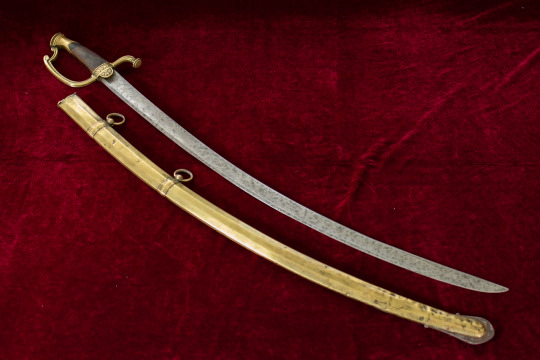
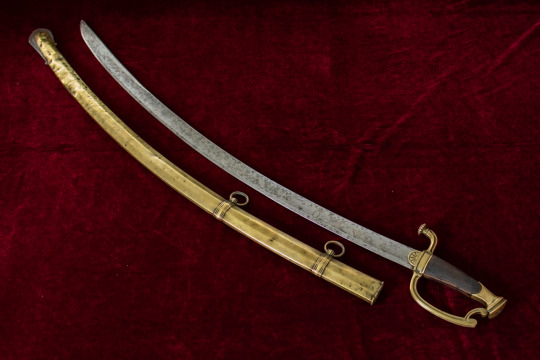
Napoleonic era French light cavalry officers' sabre with the à la Marengo style hilt
This style of sabre hilt, with the rounded langets and semi-S shaped guard. Is one of two types that are associated with the la Marengo type. The other has a similar cross guard but a pommel cap that bends towards the knuckle bow, decorated with a lions' face.
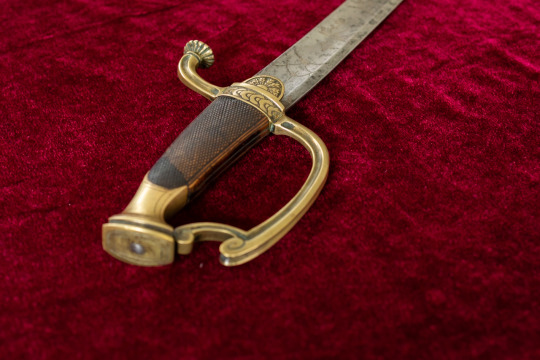
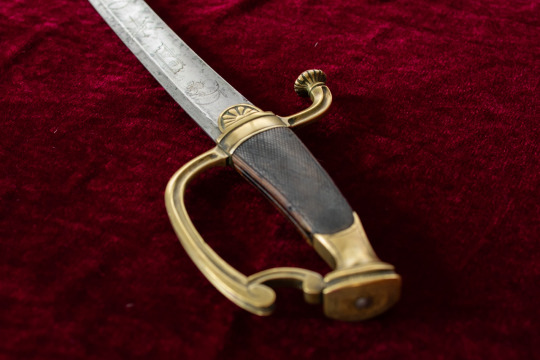
These styles are said to have gained popularity following Consular Napoleon's victory over the Austrians in Jun 1800 at the Battle of Marengo. French sword cutlers purportedly drew their inspiration from the sabre carried by Napoleon during the campaign.
It has been claimed that only officers who had participated in the battle were permitted to carry this style of hilt, however this is unlikely to have been true, given the number of surviving examples.
This sword carries a Solingen made 'export' blade with generic engraving that would originally have been highlighted in gold on a background of blue.
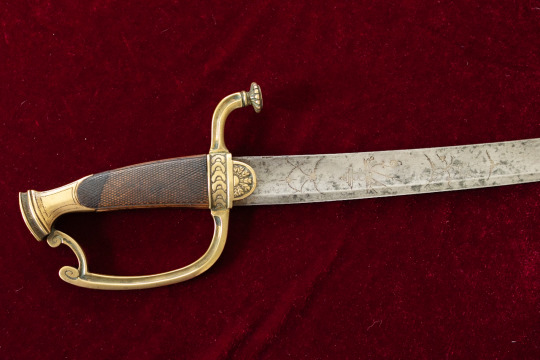
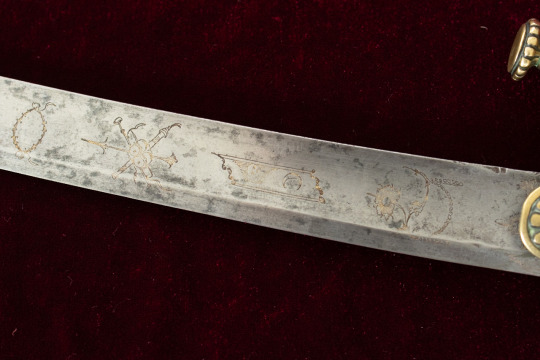
Stats: Overall Length - 935 mm Blade Length - 795 mm Curve - 54 mm Point of Balance - 140 mm Grip Length - 125 mm Inside Grip Length - 105 mm Weight - 700 grams
#swords#sabre#Napoleonic era#military antiques#antiques#sabres#cavalry swords#military#19th Century#Light cavalry#French military
82 notes
·
View notes
Text
Louis-François, Baron Lejeune (3 February 1775 in Strasbourg – 29 February 1848) was a French general, painter, and lithographer. His memoirs have frequently been republished and his name is engraved on the Arc de Triomphe.
The Battle of Marengo was fought on 14th June, 1800 between French forces under the First Consul Napoleon Bonaparte and Austrian forces near the city of Alessandria, in Piedmont, Italy.
Surprised by the Austrian advance toward Genoa in mid-April 1800, Bonaparte hastily led his army over the Alps in mid-May and reached Milan on 2nd June. After cutting Melas's line of communications by crossing the River Po and defeating Feldmarschallleutnant (FML) Peter Karl Ott von Bátorkéz at Montebello on 9th June, the French closed in on the Austrian Army, which had massed in Alessandria. Deceived by a local double agent, Bonaparte dispatched large forces to the north and the south, but the Austrians launched a surprise attack on 14th June against the main French army, under General Louis Alexandre Berthier.
Initially, their two assaults across the Fontanone stream near Marengo village were repelled, and General Jean Lannes reinforced the French right. Bonaparte realized the true position and issued orders at 11:00 am to recall the detachment under Général de Division (GdD) Louis Desaix while he moved his reserve forward. On the Austrian left, Ott's column had taken Castel Ceriolo, and its advance guard moved south to attack Lannescs flank. Melas renewed the main assault, and the Austrians broke the central French position. By 2:30 pm, the French were withdrawing, and Austrian dragoons seized the Marengo farm.
Bonaparte had by then arrived with the reserve, but Berthier's troops began to fall back on the main vine belts. Knowing that Desaix was approaching, Bonaparte was anxious about a column of Ott's soldiers marching from the north and so he deployed his Consular Guard infantry to delay it. The French then withdrew steadily eastward toward San Giuliano Vecchio as the Austrians formed a column to follow them, as Ott also advanced in the northern sector.
Desaix's arrival at around 5:30 pm stabilized the French position, as the 9th Light Infantry Regiment delayed the Austrian advance down the main road and the rest of the army reformed north of Cascina Grossa. As the pursuing Austrian troops arrived, a mix of musketry and artillery fire concealed the surprise attack of Général de Brigade (GdB) François Étienne de Kellermann’s cavalry, which threw the Austrian pursuit into disordered flight back into Alessandria, with about 14,000 killed, wounded or captured.
The French casualties were considerably fewer but included Desaix. The whole French line chased after the Austrians to seal une victoire politique (a political victory) that secured Bonaparte's grip on power after the coup.
It would be followed by a propaganda campaign that sought to rewrite the story of the battle three times during his rule.
(Information From Wikipedia)
Painting - THE BATTLE OF MARENGO
Artist(s) : LEJEUNE Louis François (baron)
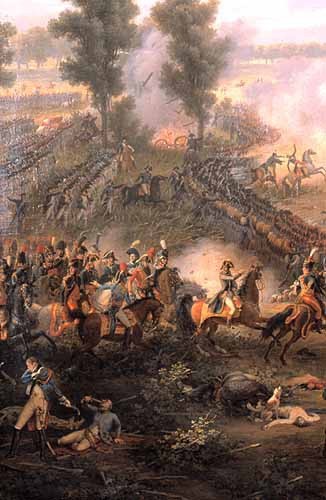
8 notes
·
View notes
Text
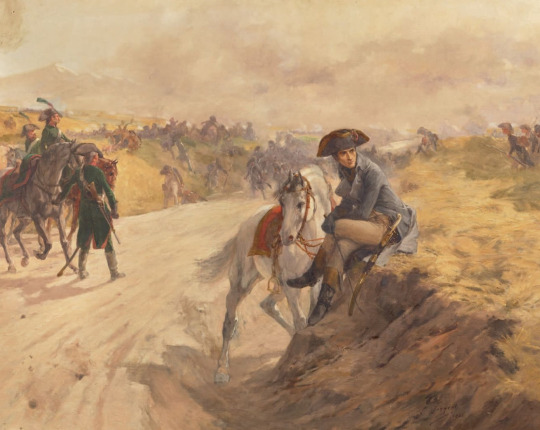
Battle scene around a road, with General Bonaparte seated on an embankment near his white horse in the foreground.
by Lucien-Pierre Sergent
#napoleon bonaparte#napoléon bonaparte#battle#scene#horse#marengo#art#lucien pierre sergent#france#europe#european#history#napoleonic#general#napoleon#napoléon#bonaparte#napoleonic wars#french revolutionary wars#landscape#italy
200 notes
·
View notes
Text
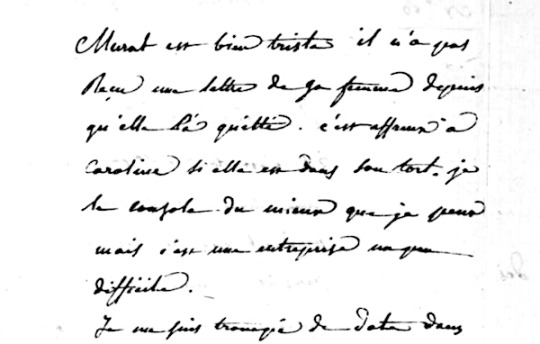
From a letter Eugène de Beauharnais wrote to his sister on 3 Messidor an VIII (22 June 1800), a couple of days after the battle of Marengo. He's on his way home, like the rest of the French troops, and tells his sister that Murat feels depressed.
[Transcription and translation to the best of my abilities.]
Murat est bien triste, il n'a pas reçu une lettre de sa femme depuis qu'elle l'a quitté. C'est affreux à Caroline si elle est dans son tort. Je le console du mieux que je peux mais c'est une entreprise un peu difficile.
Murat is very sad, he hasn't received a single letter from his wife since she left him. It's terrible for Caroline if she's in the wrong. I'm consoling him as best as I can, but it's a rather difficult business.
Considering that Hortense and Caroline were close friends and Hortense surely would tell her, I assume Eugène probably wrote this in order to get the message to Caroline and to warn her about Murat's state of mind. I also assume that this was merely a case of delayed mail during wartimes, and of Murat being overly emotional as was often the case.
#napoleon's marshals#joachim murat#napoleon's family#eugene de beauharnais#hortense de beauharnais#caroline murat#milan 1800#battle of marengo
39 notes
·
View notes
Text
Napoleon when Desaix showed up at Marengo with reinforcements:
#Napoleon#Desaix#Louis Desaix#napoleon bonaparte#napoleonic memes#Napoleon memes#napoleonic era#napoleonic#first french empire#history memes#vid#video#french empire#france#history#lol#Marengo#war of the 2nd coalition#battle of Marengo
16 notes
·
View notes
Photo

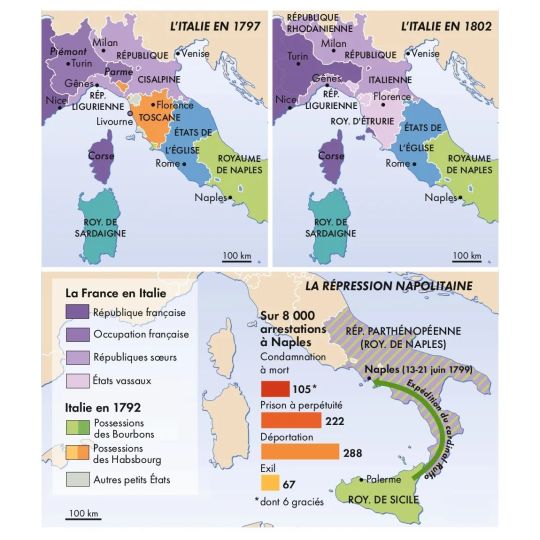
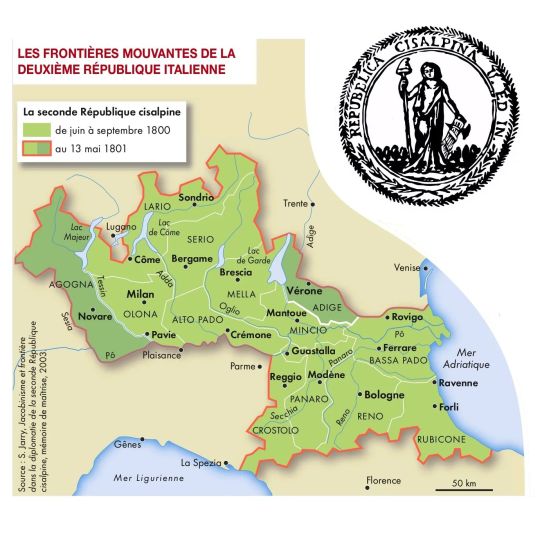

Italy from 1796 to 1805
Cartes 1-4 & 6 : « Atlas de la révolution française », Beaurepaire & Marzagalli, Autrement, 2016
Carte 5 : « Atlas de l’empire napoléonien », Chappey & Gainot, Autrement, 2e éd., 2015
by cartesdhistoire
The incursion of Bonaparte's army into Italy in the spring of 1796 was primarily a diversion to relieve pressure on the Rhine front. However, its success quickly opened up new possibilities: French support and the activism of local patriots led to the establishment of sister republics. Over three years (1796-1799), known as the Triennio, the political landscape and institutions of the peninsula underwent significant changes. This period, marked by reforms and democratic achievements, as well as the involvement of individuals previously excluded from public affairs, is crucial for understanding how the Triennio influenced the attitudes of both elites and the general populace during and after the Napoleonic era.
However, the sister republics collapsed in the spring of 1799 in the face of the successes of the Austro-Russian armies of the Second Coalition and the armed uprisings of peasants incited by the clergy and angered by French abuses. Naples surrendered in June 1799, and the repression there was severe.
The political landscape of the peninsula was once again reshaped by France following the Second Italian Campaign, which began in 1800. The Cisalpine Republic, reinstated after the Battle of Marengo and expanded during the Peace of Lunéville, gave way to the Italian Republic in 1802, then became a kingdom in 1805. The kingdom's territory expanded to include Veneto and Istria (1805), the Marche region (1808), and South Tyrol (1810). Thanks to the Vice-President of the Italian Republic, Francesco Melzi d'Eril, the political efforts during these years resulted in the establishment of a modern state and significant reforms in administration, justice, and the military.
The Napoleonic experience helped to politically educate the Italian elites, providing them with a shared institutional and legal framework, as well as standardized administrative practices, which made the idea of unity feasible.
84 notes
·
View notes